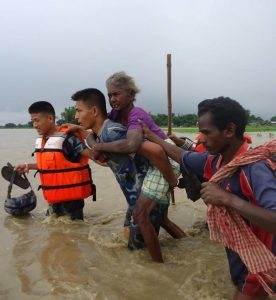Climate change experts at Practical Action have welcomed the International Development Secretary’s climate warning and are calling for investment in ingenious solutions to make the world’s poorest more resilient to disasters caused by climate change.

Communities escape flash flooding in Nepal
Colin McQuistan, Practical Action’s policy advisor on climate resilience said: “We welcome Ms Mordaunt’s warning and her rallying call on this important issue. At Practical Action we are urging policy-makers to shift investment from post disaster response to pre-event risk reduction so that natural hazards don’t turn into human disasters, this must begin by focussing on the urgent need for investment to protect those most vulnerable to climate change and its devastating effects.
“Investment needs to be long-term, allowing communities to thoroughly reduce disaster risk in every aspect of their lives, giving them the tools, skills, knowledge and opportunity to make them more resilient and more able to recover when disaster threatens.
“Following Cyclone Idai, we saw people fleeing to disaster camps that were designed following the floods in the early 2000s, these camps then flooded, leaving people desperate – more forward planning is needed, as the world needs to be prepared for all eventualities, including massive uncertainty when it comes to climate change in the future.”
Practical Action recently called for a new response to climate change in the wake of Cyclone Idai which killed scores of people and severely damaged infrastructure across a number of African nations last month.
During the World Bank roundtable Ms Mordaunt urged her international counterparts to support African nations to improve crisis preparedness and resilience, so countries can better cope with disasters, strengthen the use and accuracy of forecasts to predict destructive weather patterns, and increase the use of disaster risk financing, so countries can more easily access funding following a disaster.
As well as funding the immediate cyclone relief effort across the region, the UK has already committed to spend £5.8 billion to help developing countries respond to the challenges of climate change up to 2021. This includes making agriculture more resilient to climate shocks and improving access to clean energy.